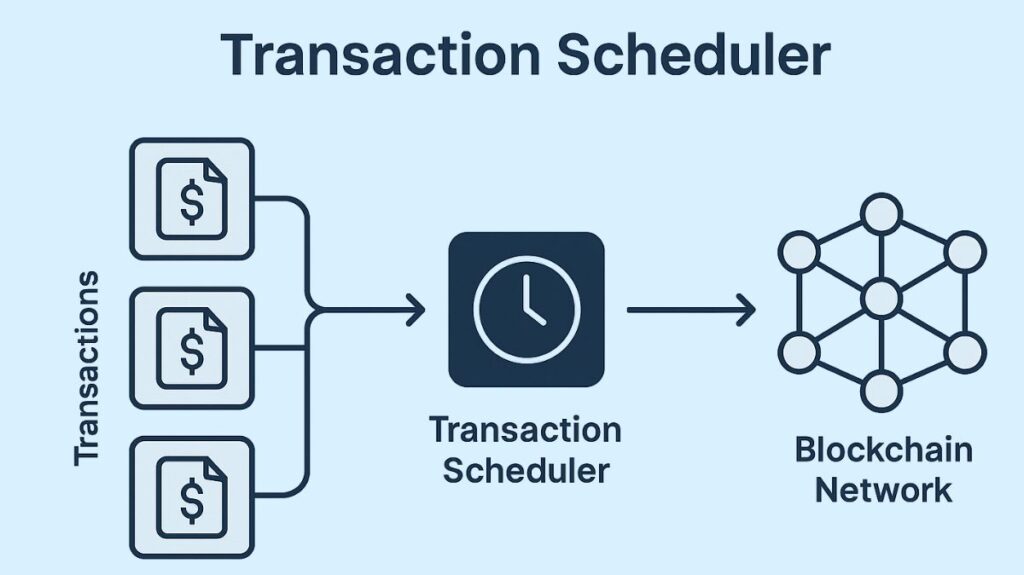Transaction Scheduler

In a blockchain network, a transaction scheduler is a mechanism that controls the sequence and time of transaction execution. It is essential for network speed optimization, particularly in sharded blockchains where scalability is improved by parallel transaction processing. Transaction scheduling seeks to cut down on congestion, transaction processing time, and possibly transaction costs.
Also Read About What Are The Blockchain Transaction Steps And Types?
Functions of a Transaction Scheduler
Ordering Transactions
Selects transaction processing order to resolve conflicts while maintaining data consistency.
Optimizing Execution Time
Reduces the total amount of time needed to complete a batch of transactions by scheduling them.
Load Balancing
In a sharded blockchain, transactions are divided among several shards or processing units to keep any one area from becoming a bottleneck.
Fee Optimization
Dynamic transaction costs can incentivize users to submit transactions during off-peak hours, reducing traffic.
Enabling Scheduled Transactions
Users of certain schedulers can plan transactions for a particular future time.
Why is Transaction Scheduling Important?
Scalability
In order to manage parallel processing across various shards, the sharding technique, which is used to increase blockchain scalability, mostly depends on effective transaction scheduling.
Also Read About Sharding In Blockchain: How It Works And Types Of Sharding
Enhancement of Performance
Schedulers can greatly cut down on the time it takes to confirm transactions by strategically organizing and scheduling transactions, which will increase network performance overall.
Decreased Traffic
Network congestion can be reduced and transaction failures during periods of high usage can be avoided by distributing the transaction load over time and various processing units.
Fee Administration
Users may be encouraged to spread out their transactions by dynamic charge adjustments, which could lower transaction costs.
Examples
Solana
To manage its blockspace and enhance its capacity to manage large transaction volumes, particularly during occasions such as token launches or NFT mints, Solana makes use of a transaction scheduler.
Hedera
With Hedera’s planned transactions, users can gather signatures for transactions in public and then carry them out later.
Sharded Blockchains
Many sharded blockchain systems use scheduling algorithms to govern transaction processing across shards for data consistency and parallel execution.
Modern blockchain systems need a good transaction scheduler for efficiency, scalability, and performance.
Transaction Executor
A transaction executor is a module or process that manages the execution of transactions in a blockchain system. This entails recording the transaction data in a new block, processing the logic of smart contracts, and updating the blockchain’s state. The executor makes sure that every transaction is carried out in compliance with the network’s regulations and that the state changes that follow are uniform throughout the network.
Transaction Processing
Smart Contract Implementation
The Transaction Executor decodes and runs smart contracts to change their state based on transaction input.
Current Situation
The executor reflects the changes brought about by the transaction by updating the pertinent portions of the blockchain’s state. For instance, the executor adjusts the sender and recipient’s balances when a cryptocurrency transaction takes place.
Keeping Records
The executor records the transaction ID, timestamp, sender, receiver, and changed state in a new block.
Transaction Executor Types
Local Executors
Value transfers and other simple transaction types are handled by built-in executors on certain blockchains.
Smart Contract Implementers
Smart contract-supporting blockchains depend on executors that can run the code specified in the contracts.
Outside Executors
Executors in certain systems may be outside parties that carry out particular transaction-related duties, such as locating assets or overseeing money on different blockchains.
Also Read About Horizontal Vs Vertical Sharding: Database Scaling Explained
Essential Roles
Verifying Transactions
By checking for adequate balance, appropriate signatures, and other restrictions, the executor confirms that a transaction complies with the network’s regulations.
Stopping Fraud
The executor aids in the prevention of fraudulent behaviors like as double-spending by verifying transactions and guaranteeing consistent state updates.
Keeping the Consensus
The executor’s activities enable blockchain consensus by ensuring all nodes agree on the ledger’s state.
Importance
Any blockchain, especially smart contract blockchains, needs a Transaction Executor.
It maintains blockchain transparency, security, and integrity by recording data, updating statuses, and confirming transactions.
